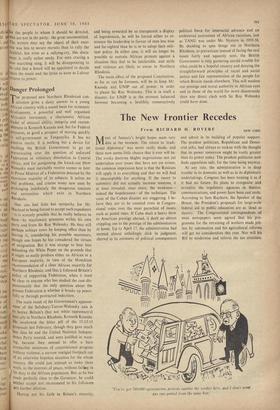banger Prolonged
THE proposed new Northern Rhodesian con- stitution givbs a dusty answer to a young African country with a sound basis for economic development, a powerful and well organised Africanist movement, a charismatic African leader of unusual ability, integrity and reason- ableness in Kenneth Kaunda and, but for Federal Pressures, as good a prospect of moving quickly to self-government as Tanganyika. It has no Positive merits. It is nothing but a device for enabling the British Government to go on prevaricating over the question of enforced Federation or voluntary dissolution in Central Africa, and for postponing the knock-out blow Welensky must inevitably receive sooner or later as Prime Minister of a Federation detested by the enormous majority of its subjects. It solves no real problems, and creates many new ones by prolonging indefinitely the dangerous tensions and animosities which exist in Northern Rhodesia.
One can feel little but sympathy for Mr. Macleod in being forced to accept such expedients it is scarcely possible that he really believes in them—by reactionary pressures within his own Party and from Sir Roy Welensky. He May still Perhaps achieve more by keeping office than by leaving it, considering his possible successors, though one hopes he has considered the virtues of resignation. But it was strange to hear him defending the White Paper on the grounds that it might as easily produce either an African or a European majority, in view of the Monckton recommendation of a clear African majority for Northern Rhodesia; and that it followed Britain's Policy of supporting Federation, when it must be clear to anyone who has studied the case dis- passionately that the only question about the present Federation is whether it breaks up peace- fully or through protracted indecision.
the main result of the Government's appease- ment of the Salisbury-Turton-Welensky axis is to betray Britain's (but not white supremacy's) best ally in Northern Rhodesia, Kenneth Kaunda. lie swallowed the bitter pill of the 15-15-15 proposals last February, though they gave much less than he and the United National Indepen- dence Party wanted, and were justified in want- ing, because they seemed to offer a bare irreducible minimum of constitutional progress Without violence, a narrow vestigial footpath out of an otherwise hopeless situation for the whole country. He could just attempt to make them work, in the interests of peace, without failing in his duty to the African population. But, as he has made perfectly clear to the Governor, he could neither accept nor recommend to his followers any further dilution.
Having put his faith in Britain's sincerity, and being rewarded by so transparent a display of legerdemain, he will be forced either to re- nounce the leadership in favour of men less wise and far-sighted than he is or to adopt their mili- tant policy. In either case, it will no longer be possible to restrain African protests against a situation they feel to be intolerable, and strife and violence are likely to ensue in Northern Rhodesia.
The main effect of the proposed Constitution, as far as can be foreseen, will be to keep Mr. Kaunda and UNIP out of power, in order to please Sir Roy Welensky. This is in itself a disaster, for UNIP is at the moment balanced between becoming a healthily constructively political force for interracial advance and an embittered instrument of African racialism, just as TANU was under Mr. Nyerere in 1957-58. By deciding to spin things out in Northern Rhodesia, to prevaricate instead of facing the real issues fairly and squarely now, the British Government is only garnering untold trouble for what could be a hopeful country and denying the straightforward principles of racial and social justice and fair representation of the people for which Britain stands elsewhere. This will weaken our prestige and moral authority in African eyes and in those of the world far more disastrously than any direct clash with Sir Roy Welensky could have done.


































 Previous page
Previous page